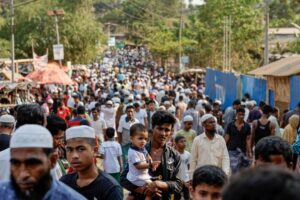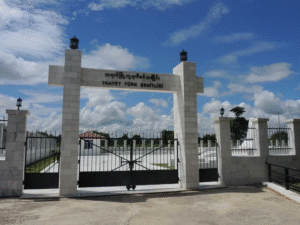“When you go home, tell them of us and say: For their tomorrow, we gave our today.”
— Inscription at the Kohima War Cemetery, India


A Battle That Changed the Course of Southeast Asia
In 1944, at the height of World War II, the Japanese Imperial Army launched its boldest campaign yet: a full-scale invasion of British India through Burma. Led by General Renya Mutaguchi, the Japanese aimed to strike into the plains of India and sever vital Allied supply lines. Their momentum had already crushed much of Burma and threatened the future of the entire region.
But at Kohima and Imphal, something extraordinary happened. A vastly outnumbered force of Allied soldiers—largely Indians from Punjab, Nepal, and Bengal—held their ground. They faced brutal, close-quarter combat in a 64-day siege, where they were surrounded, undersupplied, and outgunned.
Their resistance broke the back of the Japanese advance. The retreat that followed not only liberated Burma, but also paved the way for the freeing of Malaysia and Singapore. These soldiers had, in effect, cut off the head of fascist Japan in Southeast Asia.
And yet today, their sacrifice is either forgotten—or worse, looked down upon—by the very nations they helped liberate. Myanmar, Malaysia, and Singapore owe a deep debt to these Indian soldiers. (And to clarify: this is not written by an Indian, but by someone who values justice and historical truth.)
The Myth of the “Tatmadaw Liberators”
In contrast, Myanmar’s post-independence narrative has been carefully curated—by General Ne Win and others—to claim that freedom was won solely by the “Thirty Heroes of the Resistance” (Yebaw Thone Gyet). This militarized retelling has erased the contributions of other political groups, especially leftist movements and ethnic minority forces, who had long advocated for freedom and federalism.
Figures like Thakin Soe, U Nu, and U Ba Cho rejected Japanese fascism and fought for a pluralistic future. But Ne Win’s propaganda machine replaced this inclusive history with a glorified image of the army, feeding schoolchildren a one-sided “genealogy of liberation.” Even today, many democracy activists remain subconsciously shaped by these military-influenced textbooks.
Meanwhile, General Aung San, once the hope of a federal, civilian-led Burma, was honored in name but stripped of context. His vision for a federal union has been hollowed out by decades of centralist military control.
Rebuilding a Nation on Truth
The consequences are clear: Myanmar remains trapped, unable to escape the cycle of military coups and ethnic conflict. The failure of modern federal negotiations, including the 21st Century Panglong Conference, stems from the same root—a lack of historical honesty and political integration.
Political integration is impossible without acknowledging diverse histories and shared sacrifices. Ethnic minorities’ struggles cannot be brushed aside. Their ethnopolitical identities and rights must be part of the national dialogue. A true federal union cannot be built on a foundation of distortion.
And let us be clear: military-led histories will not lead us to peace. Nor will repeating slogans written by coup leaders who seized power not for national salvation, but out of greed and fear of losing privilege.
Myanmar, Malaysia, Singapore—and all of Southeast Asia—must recognize that our post-colonial freedom did not come from one group alone. It was won through a complex mix of anti-colonial resistance, global war, and international pressure—including, crucially, the sacrifices of thousands of Indian soldiers who died far from home.
Let us remember them not only with flowers on graves, but with truth in textbooks, honesty in public discourse, and humility in our politics.
Written in tribute to the forgotten soldiers of Kohima-Imphal and the suppressed voices of Myanmar’s true independence movement. Inspired by the blog of Dr. Ko Ko Gyi.
Credit: Zaw Moe Kyaw (source material)
Read also:
When you go home, Tell them of us, and say: For their tomorrow, We gave our today
Battle of Kohima-Imphal, 1944 which liberated Burma
Myanmar Muslims News Network
Published by U Aung San Oo
မြန်မာ့လွတ်လပ်ရေးကိုတပ်မတော်က တိုက်ယူပေးခဲ့တယ်ဆိုရာဝယ်။
ဂျပန်က တရုတ်ကိုအရှေ့ဖက်ကသိမ်းနေလို့ အိန္ဒိယကနေ ပိုးလမ်းမအတိုင်းမြန်မာကိုဖြတ်ပြီး တရုတ်ကိုထောက်ပံနေတဲ့ အင်္ဂလိပ်ရဲ့ ထောက်ပံရေးလမ်းကြောင်းကိုဖြတ်တောက်ဖို့ ဂျပန်က မြန်မာပြည်ကိုဝင်တိုက်တာ။ သွားခေါ်လာလို့မဟုတ်ဘူး။ နောက်ဆုံးအင်္ဂလိပ်နဲ့အကြီးအကျယ်တိုက်ပွဲက အိန္ဒိယအရှေ့မြောက်မှာဖြစ်ခဲ့တာ။
ဂျပန်က မြန်မာပြည်ကိုဝင်တိုက်တာ အင်အား ၂ သိန်းလောက်ရှိတယ်။ သေတဲ့ဂျပန်စစ်သားကြီးဘဲ ၄ သောင်းကျော်တယ်။ ယိုးဒယားမှာဖွဲတဲ့ မြန်မာတပ်က အင်အား ၁၆၀၀ ဘဲရှိတယ်။ အင်အားသိန်းနဲ့ချီတဲ့တပ်တွေကို ဘယ်လိုတိုက်မလဲ။ ဂျပန်က လမ်းပြတောင်မခေါ်ဘူး သူဘာသူဝင်တိုက်သွားတာ။ ရန်ကုန်ကို ဂျပန်မသိမ်းမီအရင်ရောက်အောင် သိမ်းဖို့ လုပ်တာလမ်းမှာစစ်ကြောင်းပျက်သွားလို့ မသိမ်းလိုက်ရဘူး။
အင်္ဂလိပ်ကလည်း တပ်မ ၂ ခုဘဲထားခဲ့ပြီးပြန်ဆုတ်သွားတာ။ တင်းတင်းရင်းရင်း ခံတိုက်တာတောင်မဟုတ်ဘူး။ ဆုတ်ခွါလို့ရအောင်တားတာလောက်ဘဲခံစစ်တိုက်သွားတာ။ ဂျပန်က ယိုးဒယားမှာတပ်ပြင်နေကတည်းက အင်္ဂလိပ်ကဆုတ်နေပြီ၊ ဥရောပမှာ ဂျာမန်နဲ့တိုက်နေရလို့ အိင်္ဂလိပ်ကမြန်မာပြည်ကိုဆုတ်ပေးလိုက်တာ။ တပ်မတခုက ရှမ်းပြည်အပေါ်ပိုင်းပိုးလမ်းကိုကာတယ်။ တရုတ်တပ်မ ၂ ခုအင်္ဂလိပ်နဲ့လာပေါင်းခဲ့တယ်။ နောက်ပြီး အိန္ဒိယအရှေ့မြောက်ကနေ ပိတ်ခံထားတယ်ဒါပါဘဲ။ ဂျပန်က မုံရွာတို့ တမူးတို့ဘက်ကနေဖြတ်ပြီး အိန္ဒိယအရှေ့မြောက်ကိုတိုက်တယ်။
ဖက်ဆစ်ဂျပန်တော်လှန်ရေးဆိုပြီး ဂျပန်ကိုတိုက်တော့လည်း အင်္ဂလိပ်က အမေရိကန်အကူအညီယူပြီးပြန်တိုက်တာ၊ အိန္ဒိိယကနေအင်အားဖြည့်ပြီးပြန်တိုက်တာ၊ ဂျပန်တွေက ဒုတိယကမ္ဘာစစ်မှာစစ်ရှုံးနေပြီ၊ တမူးဘက်ကနေ မော်လမြိုင်ကို ထောင့်ဖြတ်ဆုတ်ခွါပြီး ယိုးဒယားကိုပြန်ဝင်တာ။ BIA မြန်မာတပ်က အင်အား ၃ သောင်းအထိရောက်ခဲ့ဖူးတယ်၊ ဒါပေမယ့် ဂျပန်ကခွင့်မပြုလို့ BDA ဖြစ်ပြီး အင်အား ၃၀၀၀ ကျော်ဘဲရှိတယ်။ ဘယ်လိုတိုက်မလဲ။ ဆုတ်သွားတဲ့ဂျပန်ကို အင်္ဂလိပ်ကနောက်ကနေလိုက်တိုက်တာ၊ မန္တလေးကျော်လို့ မိတ္ထိလာရောက်တော့မယ်။ အဲဒိတော့မှ ဗိုလ်မှုးဗထူးကထတိုက်တာ။ မဟုတ်ရင် ဂျပန်ဖက်ဆစ်နဲ့ပေါင်းတဲ့စစ်တရားခံဖြစ်တောမယ်။ နောက်တော့ ဖက်ဆစ်ဂျပန်တော်လှန်ရေးဆိုထလုပ်တာ။ အဲဒါတောင် ကွန်မြူနစ်ဘိုးအေကြီး သခင်စိုးကိုပင့်ပြီးလုပ်ခိုင်းရတာ။ အဲဒိမှာ ဖတပလတို့ ဖဆပလတို့ ဖြစ်လာတာ။ ဒါတောင်အခု ဖက်ဆစ်တော်လှန်ရေးနေ့နဲ့ တပ်မတော်နေ့ငြင်းနေကြတုန်း။ ဘာအကြောင်းထူးမှာမို့လို့တုန်း။
ထားပါတော့လေ မြန်မာလွတ်လပ်ရေးလှုပ်ရှားမှုက အကြမ်းမဖက်တဲ့နည်းပါ။ အိန္ဒိိယနဲ့ခေတ်ပြိုင်အတူယှဉ်တွဲလုပ်ခဲ့ကြတာ။ YMBA ကစလို့ ၁၃၀၀ ပြည့်အရေးတော်ပုံ၊ ဗိုလ်အောင်ကျော်ကျောင်းသားသပိတ် အကြမ်းမဖက်တဲ့နည်းနဲ့ပါ။ နိုင်ငံရေးလောကမှာ လက်နှက်မပါဘူး။ နောက်မြန်မာ့တပ်မတော်ဆိုတာဖြစ်လာမှ နိုင်ငံရေးသမားတွေကြားထဲ သေနတ်ကိုင်တွေပါလာတာ။ဂျပန်နဲ့သွားပေါင်းတာတွေကိုလည်းမြန်မာနိုင်ငံရေးသမားတွေကလက်မခံခဲ့ဘူး၊ သခင်စိုး၊ ဦးနု၊ ဦးဘချို၊ သူတို့တွေကလက်မခံကြဘူး။ ဂျပန်ဟာ ဖက်ဆစ်ဖြစ်နေလို့။ အဲဒိဂျပန်ကျောင်းဆင်းတွေထဲက ဦးနေဝင်းကဘဲ နောက်ဆုံး စစ်တပ်တွင်းအာဏာသိမ်းတယ်။ နောက်တော့ တိုင်းပြည်အာဏာပါသိမ်းခဲ့တယ်။ အဲဒိ မြန်မာ့တပ်မတော်ဆိုတာကို ဂျပန်မှာသွားမထောင်ခဲ့ရင် လောင်းကစားလုပ်မိန်းမလိုက်ပြီး လေလွင့်နေတဲ့ မြန်မာပြည်ဖွားတရုတ်လူငယ်တဦးဖြစ်တဲ့ ကိုရှု့မောင်ဟာ ဘယ်လိုနည်းနဲ့မှ နိုင်ငံရေးခေါင်းဆောင် တိုင်းပြည်ခေါင်းဆောင်ဖြစ်လာစရာမရှိဘူး။ သူ့အတွက်တော့အခွင့်အလမ်းဖြစ်သွားတာပေါ့။ တိုင်းပြည်အတွက်ကတော့ ကံဆိုးသွားတာပေါ့။ လွတ်လပ်ရေးအတွက် လက်နှက်ကိုင်တိုက်ခဲ့တာမဖြစ်စလောက်ပါ။ တိုင်းပြည်ကို နှိပ်စက်နေတာဒီကနေ့အထိဘဲ။ နောက်ဆုံး အိန္ဒိယလည်း လွတ်လပ်ရေးရတာဘဲ။ ဘာလက်နှက်ကိုင်မှမပါဘူး။ အိန္ဒိယမှာ အင်္ဂလိပ်ထားပေးသွားတဲ့စစ်တပ်ဘဲ။ တခါမှအာဏာသိမ်းတယ်မကြားမိဘူး။ မြန်မာပြည်မှာကတော့ ဂျပန်ကျောင်းဆင်းတွေဘဲ အာဏာသိမ်းပြီးရင်းသိမ်းနေတော့တာဘဲ။ တိုင်းပြည်လည်း နာလန်ကိုမထူတော့ဘူး။ မြန်မာပြည်မှာလည်း အင်္ဂလိပ်ကစစ်တပ်ကိုထားပေးသွားပါတယ်။ Military transition စစ်တပ်အသွင်ကူးပြောင်းရေး လုပ်ပေးသွားပါတယ်။ ဗိုလ်ချုပ်စမစ်ဒွန်းကို ဦးစီးချုပ်ခန့်ပြီး။ စစ်တပ်ကိုထားပေးသွားတယ်၊ ဗိုလ်ချုပ်စမစ်ဒွန်းက အိန္ဒယမှာရှိတဲ့ အင်္ဂလိပ်ဗိုလ်သင်တန်းကျောင်းဆင်းပါ။ မြန်မာ့တော်လှန်ရေးတပ်ကိုဖျက်ပြီး ဆက်လက်စစ်မှုထမ်းလိုသူများကို အစိုးရတပ်ထဲမှာဆက်လက်တာဝန်ထမ်းစေခဲ့ပါတယ်။ ဆိုလိုတာက ဒီကနေ့ မြန်မာ့မတပ်တော်ဟာ ရဲဘော်သုံးကျိပ်ကနေ တိုက်ရိုက်ဖြစ်လာတဲ့တပ်မဟုတ်ပါဘူး။ ကရင်တွေတော်လှန်ရေးလုပ်တာအကြောင်းပြပြီး၊ ဗိုလ်နေဝင်းက ဗိုလ်ချုပ်စမစ်ဒွန်းကိုဖယ်ပြီး တပ်ထဲမှာအာဏာသိမ်းယူခဲ့တယ်။ဗိုလ်ချုပ်စမစ်ဒွန်းက ကရင်ဖြစ်နေလို့။ အဲဒိမှာမြန်မာ့တပ်မတော်ဟာ ဂျပန်တပ်မတော်စဖြစ်တာဘဲ။ ဗိုလ်ချုပ်စမစ်ဒွန်းဟာ professional solder ဝန်ထမ်းကောင်းပီသတဲ့စစ်သားအဖြစ်ပြသခဲ့တယ်။ သူအနားယူတော့ ကရင်ပြည်နယ် မသွားဘူး၊ ကချင်ပြည်နယ်သွားနေခဲ့တယ်။ ဘာမှမတုန့်ပြန်ခဲ့ဘူး။
လွတ်လပ်ရေးကို ရဲဘော်သုံးကျိပ်ကဘဲတိုက်ယူပေးသလိုလိုလုပ်တာဟာ ဗိုလ်နေဝင်းလက်ချက်ပါ။ ကျန်တဲ့နိုင်ငံရေးအင်အားစုတွေ၊ တိုင်းရင်းသားအင်အားစုတွေရဲ့သမိုင်းကိုဖျောက်ခဲ့တယ်။ အထူးသဖြင့် လက်ဝဲနိုင်ငံရေးအင်အားစုတွေရဲ့သမိုင်းကိုဖျောက်ပစ်ခဲ့တယ်။ အဲဒိ ခေတ်က တိုးတက်တဲ့အမြင်နဲ့ နယ်ချဲ့ဆန့်ကျင်ရေးအမြင်ရှိတဲ့အင်အားစုတွေဟာ လက်ဝဲသမားတွေဘဲ။ ဒါတွေကိုဖျောက်ပစ်ခဲ့တယ်။ နောက်ဆုံးကျွန်းပို့ထောင်ချလုပ်ခဲ့တယ်။ သူက ရဲဘော်သုံးကျိပ်သမိုင်းဘဲတင်မှာပေါ့ သူ့မှာကဒီသမိုင်းတခုဘဲရှိတာကို။ ကျောင်းသုံးစာအုပ်ထဲပါထည့်ပြီး တနိုင်ငံလုံကို Brainwash ဘရိန်းဝပ်ရှ် လုပ်ရိုက်သွင်းထားခဲ့တာ။ ဗိုလ်ချုပ်အောင်ဆန်းကိုတော့ အထာလေးထားပြီး ထိပ်ကတင်ထားခဲ့တယ်။ အခုနောက်ပိုင်း ပြည်တွင်းကဒီမိုကရေစီလုပ်တဲ့သူတွေတောင် အဲဒိသင်ရိုးညွှန်းတမ်းရဲ့လွှမ်းမိုးမှုတွေရှိနေတုန်း။ အတော်များများကခေါင်းထဲမှာဒါဘဲစွဲနေတာ။
မြန်မာပြည်ကောင်းစားချင်ရင် တိုင်းပြည်သစ်ကို သမိုင်းမှန်တွေ၊ နိုင်ငံရေးတန်ဘိုးအသစ်တွေနဲ့ပြန်တည်ဆောက်မှရမယ်။ ဂျင်း သမိုင်းနဲ့တော့မရဘူး။ ဒီဂျင်းသမိုင်းတွေနဲ့ပြည်ထောင်စုလည်း စုစည်းလို့ရမဘူး။ ၂၁ ပင်လုံတို့ဘာတို့ မအောင်မြင်ရခြင်းရဲ့ အခြေခံအကြောင်းတွေထဲမှာ အဲဒိသမိုင်းရေးအမြင်ကအစပြဿနာတက်နေလို့ဘဲ။ ပြောရရင် မော်လမြိုင်တံတားနဲ့ လွိုင်ကော်က ကျောက်ရုပ်ကိစ္စအထိ၊ အားမနာတမ်းမဆင်မခြင်ဆဲကြဆိုတာကြတာတွေဟာ ဦးနေဝင်းရဲ့အောင်မြင်မှုတွေဘဲ။ ဒီမှိုင်းတွေနဲ့ တပ်ထဲမှာ လည်းချုပ်ထားတာ။ မြန်မာ့တပ်မတော်မှာလည်း ဒါတွေဘဲရိုက်သွင်းထားတာ။ မြန်မာ့တပ်မတော်ဟာ ဒုတိယကမ္ဘာစစ်က ဂျပန်ကျောင်းဆင်းအတွေးအခေါ်ဘဲရှိသေးတယ်။ ဒါပေမယ့် ပြည်သူတွေက ဗိုလ်ချုပ်အောင်ဆန်းကိုစွပ်ကြည်ငြိုပြီး၊ သူ့သမီးကို စွန်းတွေထောက်ခံနေတော့ မြန်မာ့တပ်မတော်ကမကြည်ပြန်ဘူး။ သူ့ရှုးသူ့ပတ်ဖြစ်နေပြန်ရော။ တိုင်းပြည်ကအဲဒိမှာတင်တိုင်ပတ်နေတာ။ အခုလည်း သူ့မကြည်လို့ အာဏာသိမ်းတာဘဲ ရှင်းရှင်းပြောရရင်။ လောဘကြီးလို့ ဘာဖြစ်လို့ညာဖြစ်လို့ ကြိုက်တာပြော၊ မလွတ်ဘူး။ မြန်မာပြည်ကနိုင်ငံရေးလုပ်နေတဲ့သူအတော်များများနဲ့ ထောက်ခံသူအများစုဟာ အဲဒိ ဂျင်းသမိုင်းထဲမှာဘဲလည်နေတုန်း။
political integration နိုင်ငံရေးအရသဘောတူပူးပေါင်းမှုမရှိရင် ဖက်ဒရယ်ပြည်ထောင်စုဆိုတာတည်ဆောက်လို့မရဘူး။ ငြိမ်းချမ်းရေးလည်းမရဘူး။ political integration ရှိဖို့ဆိုတာ သမိုင်းတွေတန်ဘိုးတွေကပါ အမှန်အတိုင်းဖြစ်မှရမယ်။ political integration ဆိုတာ အခုမြန်မာအင်အားစုတွေထဲမှာတင် မရဘူးဖြစ်နေတယ်။ တဘက်စောင်းနင်းတွေကြီးဘဲ။ တိုင်းရင်းသားတွေနဲ့ဆိုပိုဆိုးပေါ့။ ethnopolitics တိုင်းရင်းသားတွေရဲ့ နိုင်ငံရေးဟာလည်းချန်လှပ်ထားလို့မရဘူး။ ဒါတွေမရှိရင် တိုင်းပြည်ဟာငြိမ်းချမ်းရေးမရဘူး။ ဖဒရယ်ပြည်ထောင်စုဆိုတာဖြစ်မလာဘူး။ မြန်မာနိုင်ငံဟာ တိုင်းပြည်သစ်နိုင်ငံသစ်ထူထောင်ရမှာ။ ဒါကြောင့် စစ်အာဏာရှင်တွေရိုက်သွင်းထားတဲ့သမိုင်းတွေကိုအခြေခံပြီးတော့၊ ဒါမှမဟုတ် ဒီသမိုင်းလောက်ဖတ်ထားရုံလောက်နဲ့တော့ ဖဒရယ်ပြည်ထောင်စုတည်ဆေက်လို့မရဘူး။ အထူးသဖြင့်တော့ပြည်တွင်းကဗမာတွေသတိထားမိဖို့လိုတယ်။
credit Zaw Moe Kyaw





